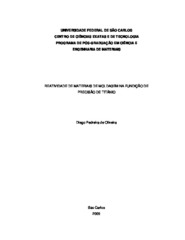Reatividade de materiais de moldagem na fundição de precisão de titânio
Abstract
Investment casting of Titanium parts free of defects is very difficult owing to the reactivity of this element in the liquid state .The objective of this study was to evaluate the reactivity of titanium with refractory oxides of high thermodynamic stability, such as yttria and alumina. Centrifugal castings of small parts were carried out by melting the metal in an yttria coated crucible and pouring the liquid into molds coated with a mixture of yttrium and aluminum oxides. As binder for the powders were added colloidal suspensions of silica, alumina, yttria or zirconium acetate. Only the silica and alumina colloidal bonded the moulds with useful mechanical strength allowing the centrifugal casting trials. Both, yttria colloidal and zirconium acetate were excluded of the trials. By analyzing the hardness profile it could be noted that a similar curve was obtained for different moulds (oxides plus binder) related to the hardened layer thickness. However, the molds using a higher thermodynamic stability combination of binder and oxides presented lower Vicker values. The pair Yttria/Alumina colloidal induced less than 350 Vickers and Alumina/Alumina colloidal less than 720 Vickers on the surface of titanium as cast, for instance. Finally, a mathematical simulation of the process was proposed and it could be well adjusted and compared to the experimental graphics.
